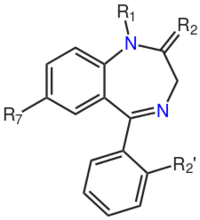Benzodiazepines
Benzodiazepines (also referred to as benzos) are psychoactive drugs that act as central nervous system depressants. These drugs work by magnifying the efficiency and effects of the neurotransmitter gamma aminobutyric acid (GABA) by acting on its receptors.[1] The prominent effects of benzodiazepines include sedation, muscle relaxation, disinhibition, and amnesia. Short-acting benzodiazepines are recommended for treating insomnia while long-acting ones are recommended for the treatment of anxiety disorders.

Subjective effects
The primary subjective effects of any benzodiazepine are # key components which occurs in varying levels of intensity across a broad range of substances. These effects are listed and defined in detail within their own dedicated articles below:
Alongside of these, a variety of non-essential secondary effects are often present. These generally include but are not limited to:
Examples
Discontinuation
It is notoriously difficult to discontinue use of benzodiazepines, and potentially life threatening for tolerant individuals using regularly to do so without tapering their dose over a period of weeks. Benzodiazepines are positive allosteric modulators of GABA receptors, so as the brain is calibrated to operate with higher than usual inhibition, the number of GABA receptors expressed is reduced via downregulation. Abrupt discontinuation following chronic use of benzodiazepines causes rebound stimulation which presents as anxiety, insomnia and restlessness while the body attempts to return to homeostasis.
There is an increased risk of seizure following discontinuation of benzodiazepines. Drugs which lower the seizure threshold such as tramadol should be avoided during withdrawal. It is safest to reduce the dose each day by a very small amount, for a couple of weeks until close to abstinence. If using a short-half life benzodiazepine, a longer acting variety such as diazepam can be substituted. Symptoms may still be present, but their severity will be reduced significantly. Small amounts of ethanol can also help to reduce the symptoms.
Duration and severity of symptoms depends on a number of factors including the half life of the drug used, tolerance and the duration of abuse. Major symptoms will usually start within just a few days after discontinuation and persist for around a week for shorter lasting benzodiazepines. Benzodiazepines with longer half-lives will exhibit discontinuation symptoms with a slow onset and extended duration.
See Also
References
- ↑ Benzodiazepine interactions with GABA receptors | http://www.ncbi.nlm.nih.gov/pubmed/6147796